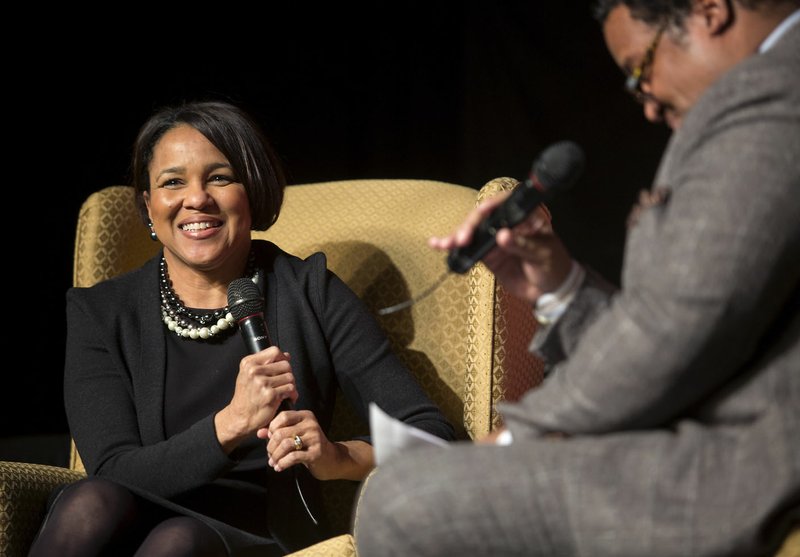FAYETTEVILLE -- Sub-freezing temperatures Monday drove a planned Martin Luther King Jr. Day march indoors, but the broader march toward equality and freedom for all races must go on, area leaders said at events honoring the civil rights leader.
Hundreds of people of every age and skin color gathered for a midday vigil and an evening re-commitment banquet celebrating King's work a half-century ago. Organizers and student leaders said the day brings a mix of emotions: disappointment that King's work isn't finished, gratitude to those who came before them and the hope and resolve to keep working toward King's vision of love and unity.
"The challenge is for each of you to have a dream," said Angela Mosley Monts, president of the Northwest Arkansas Dr. Martin Luther King Jr. Council, which sponsored the events. "What will you do?"
Again and again speakers referred to the 1963 "I Have a Dream" speech King delivered in front of hundreds of thousands in Washington. The Baptist minister spoke of "one day" when the nation will live up to its ideals.
"Dr. King, we are still waiting for that day; it's 2016 and somehow we are still waiting for that one day," said Joseph Daniels III, an engineering doctorate student who was the keynote speaker for the vigil in the University of Arkansas Union. "How do we get to that glorious day?"
King and other figures brought down Jim Crow segregation laws, but the lynchings and violence of King's time have given way to the deaths of black people at the hands of police, prejudice toward Muslim Americans and the persistent problems of homelessness and hunger today, Daniels said.
The deaths of Freddie Gray, Tamir Rice and other unarmed black people in the past two years have prompted widespread, sometimes violent protests of police use of force. Authorities in many cases say the force is justified, but protesters see a long-standing pattern, and some of the deaths have led to murder charges for officers.
Daniels said the non-violent King knew the answer for these and other problems: "Overflowing love" among all people.
"We can't wait to love our enemies, we can't wait to love our countrymen," Daniels said. "It must start now, today."
King, a Nobel Peace Prize winner, led protests and efforts against segregation, poverty and war before his 1968 assassination at age 39. He preached non-violence, imploring activists to stay peaceful in defiance of their oppressors' rage. Some leaders criticized this approach as too soft, but King nonetheless was jailed multiple times.
"We will match your capacity to inflict suffering with our capacity to endure suffering," King once said, according to his New York Times obituary. "We will not hate you, but we cannot in all good conscience obey your unjust laws."
Kristen Smith, a university senior who performed a spoken-word poem at the vigil, said she often worried for her brother's and nephews' safety. But she thanked those who came before her for making the country better.
"We love to talk about the fight, but what about the victories," Smith said. "We live in a country where I am free to dream."
The country can't achieve the end of racism passively, said Trey Smith, president of Dream Keepers, a youth organization affiliated with the King council.
"We have to actively work to embrace our brothers and sisters," with all of their different perspectives and experiences, Smith said. "We have to actively work against the socialization that tells us that we have already made it, because that is the danger."
The banquet was held at the Town Center after sunset. The council awarded about two dozen scholarships to high school and college students and professionals and also gave several achievement awards to local leaders.
Rosalind Brewer, president and CEO of Sam's Club, said today's youth must take the lead in bringing people together.
"I'm optimistic about what can happen there," she said.
NW News on 01/19/2016
